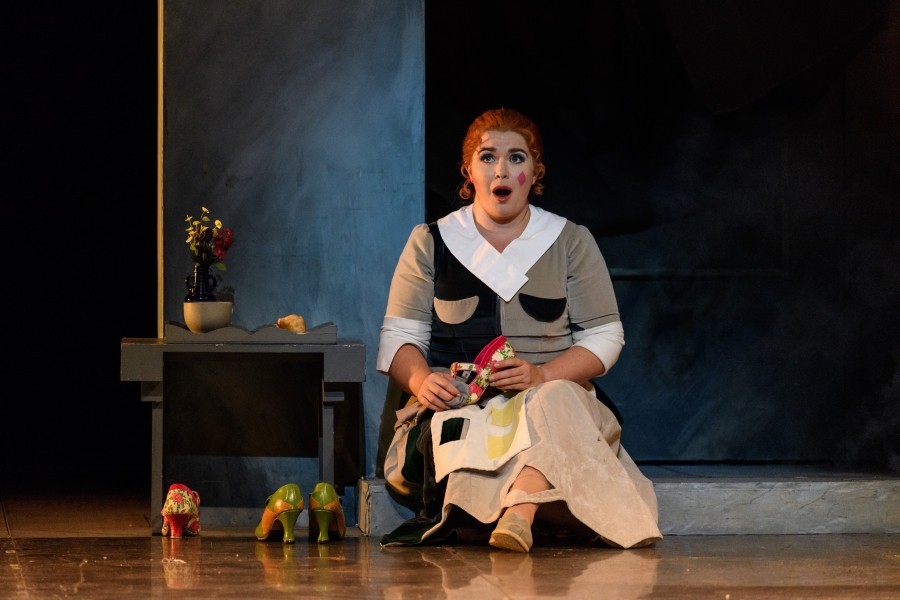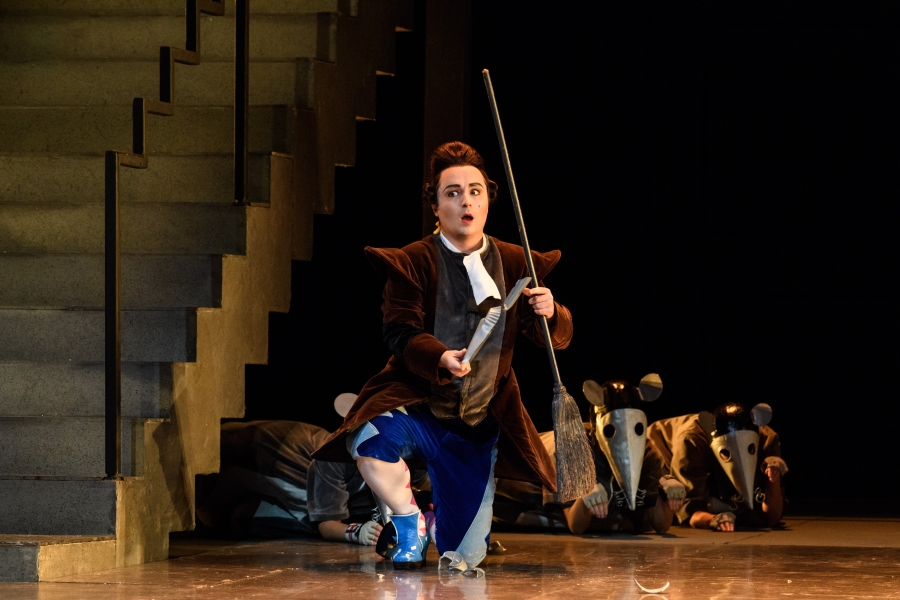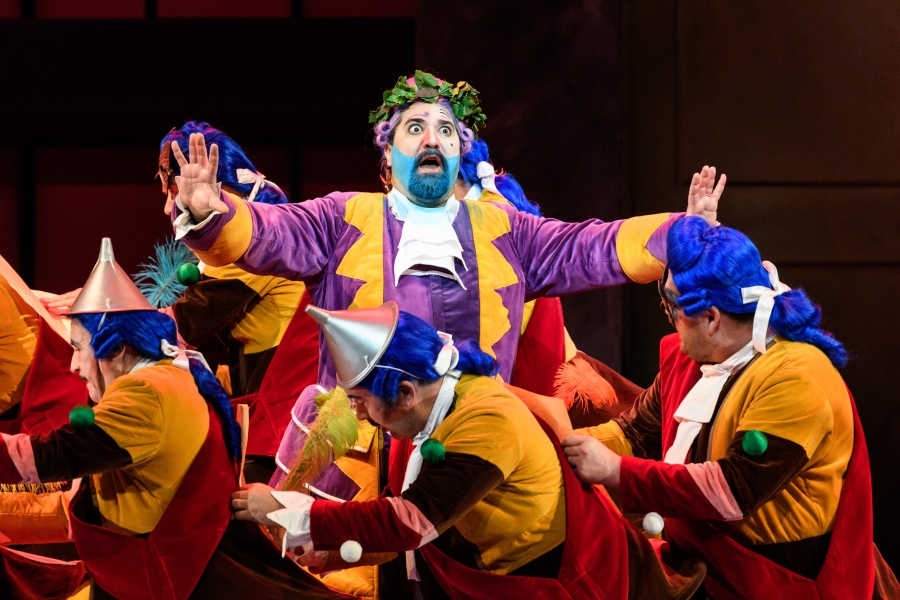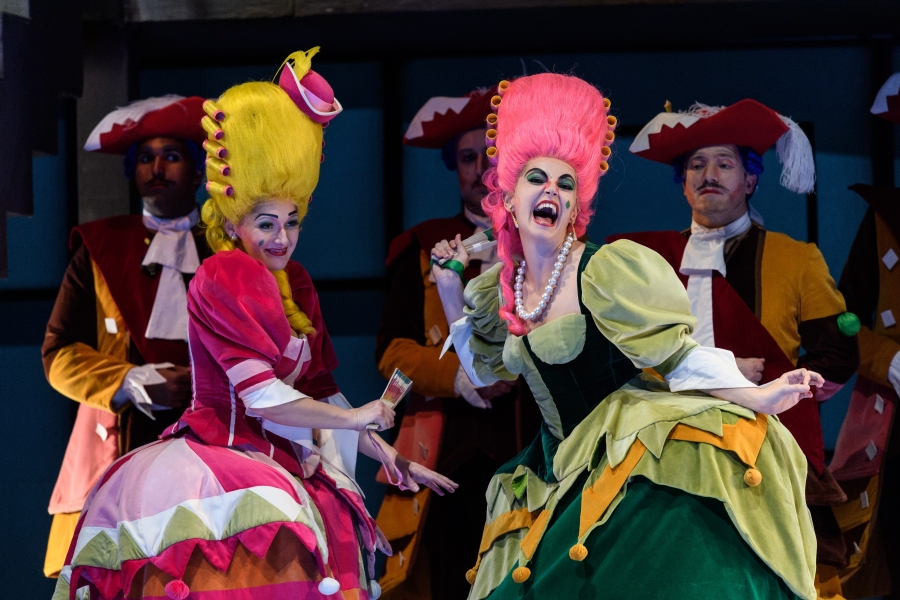WNO closes its Autumn season on an upbeat note with Rossini’s La Cenerentola, a humorous and quick-witted take on the famous fairytale of Cinderella with a fast, virtuosistic musical score, plenty of tongue-in-cheek humour, and an all-round happy ending. As entertaining as it is musically challenging, this opera put its cast to the task of keeping up with its pace while still delivering lighthearted performances. For the most part, this was achieved, and this production turned out to be entertaining, imaginative, and often outright funny.
Tara Erraught as Cinderella showed off a voice that was at its most impressive on the lower part of her register, while occasionally coming across as slightly strained on the higher notes; but it is on the lower notes that the part as written by Rossini is the strongest, and her voice proved perfectly suited to the score. Perhaps the most challenging part was that of the Prince Don Ramiro, to whom Matteo Macchioni’s performance lent a light-footed, witty personality that allowed to navigate even the trickier musical moments with grace and levity. Also worthy of note are the performances of Aoife Miskelly and Heather Lowe as the stepsisters, and Wojtek Gierlach as Alidoro, the latter coming across as particularly powerful in his moment at the centre of the stage in the first act. Fabio Capitanucci shoulders the comedic role of the Baron with a solid stage presence. Perhaps most remarkable, however, was the masterful performance of Giorgio Caoduro as Dandini, who, especially in the first act, almost always stole the scene with his impressive vocal command and delightful physical acting. His interactions with Macchioni’s Prince came across effortless and engaging, and in general the two showed a great ease in playing off each other, something truly important given the dynamics of their two characters and which made the first half of the opera all the stronger. In general, the whole cast is to be commended not only on their singing, but on their acting performances, something that can be often cast aside in opera in favour of technical perfection. This was not the case here, and it was truly a delight to see the cast engage with their characters and give away the distinct sensation that they were having as much fun with telling the tale as the audience was having in watching it. Tomáš Hanus’ direction of Rossini’s score is lively and animated, in keeping with the general tone of the work.
Tara Erraught
Matteo Macchioni
Fabio Capitanucci
Aoife Miskelly and Heather Lowe
The staging took a departure with the previous austere, philological choices adopted by WNO in this Autumn season, drawing inspiration from a Baroque aesthetic mixed with pastel colours and a tad of camp. This matched perfectly the mood of the opera, and it was very interesting to see the many inventive solutions taken in terms of staging and direction to depict the various transitions and moments of the plot. The silent stage presence of masked dancers as mice, working both as a mute commentary on the action and as aides to the staging itself, was a clever way to work around the representation of some things that would otherwise have been left offstage (the moment with the Prince’s carriage riding through the storm in search of Cinderella, for instance, was remarkable for its ingenuity). The set never came across as too crowded, even when the larger props came in, and all in all it was a good example of how an alternative staging can be offered without damaging the general delivery of a work. It did help that the tale of Cinderella, by its own nature of fairytale, can be set in any time and any place – or, as in this case, in a time and place unspecified.
While the first half came across as somewhat stronger than the second, probably by virtue of its frequent comedic exchanges, the whole work was consistently entertaining, expertly delivered and certainly closes this Autumn season for the WNO on a high. It was also an excellent occasion to present on the stage an opera that is not represented as often as it would deserve to, including a different approach – lighter, wittier, more technical – to the tenor’s part than is usually popular in operas nowadays. Aside from being a truly entertaining evening, it could also be a perfect occasion to introduce older children to the opera – while still perhaps too long for the younger ones, this is a colourful, humorous, easily approachable subject that would work well as an early introduction to this art form for the younger generation.
Further performance at Wales Millennium Centre: Sunday, October 7
Images: Jane Hobson
About Arts Scene in Wales:




Thoroughly agree having just returned from last night in Cardiff. Wonderful staging, balanced and beautiful singing and lively orchestra. And those mice…! One quibble: would Cinderella have married wearing the same dress that was supposed to be covered in cinders? A rapid Velcro assisted change into her white ball gown would have made more sense especially wearing a crown!